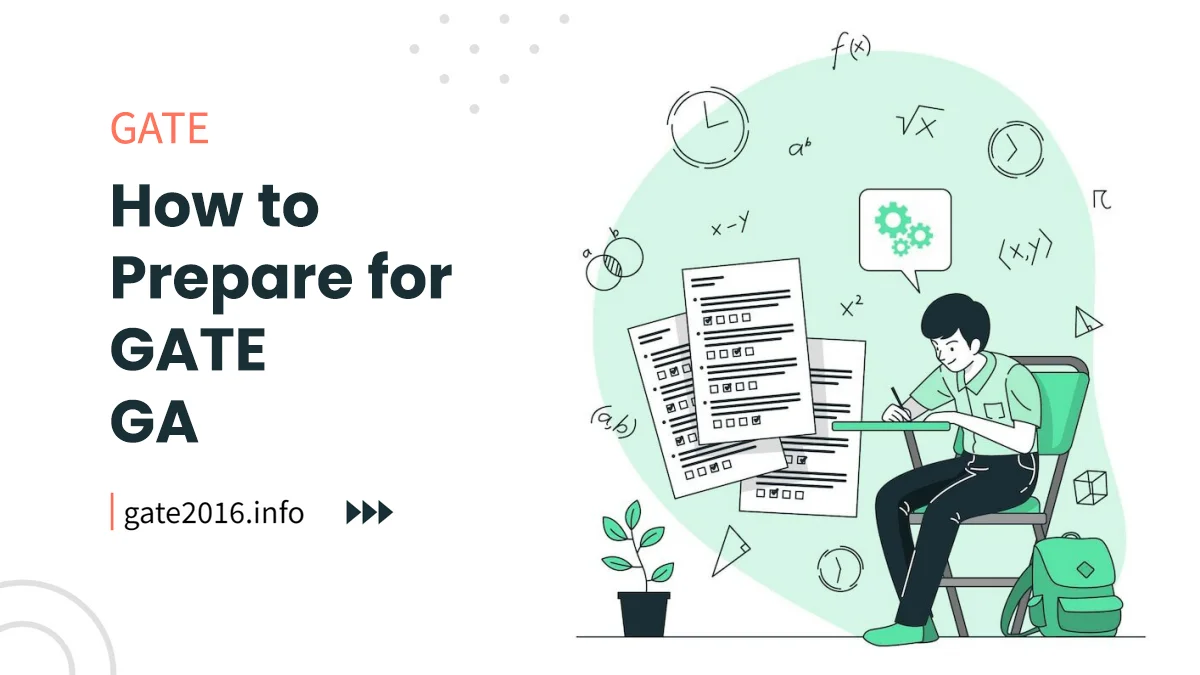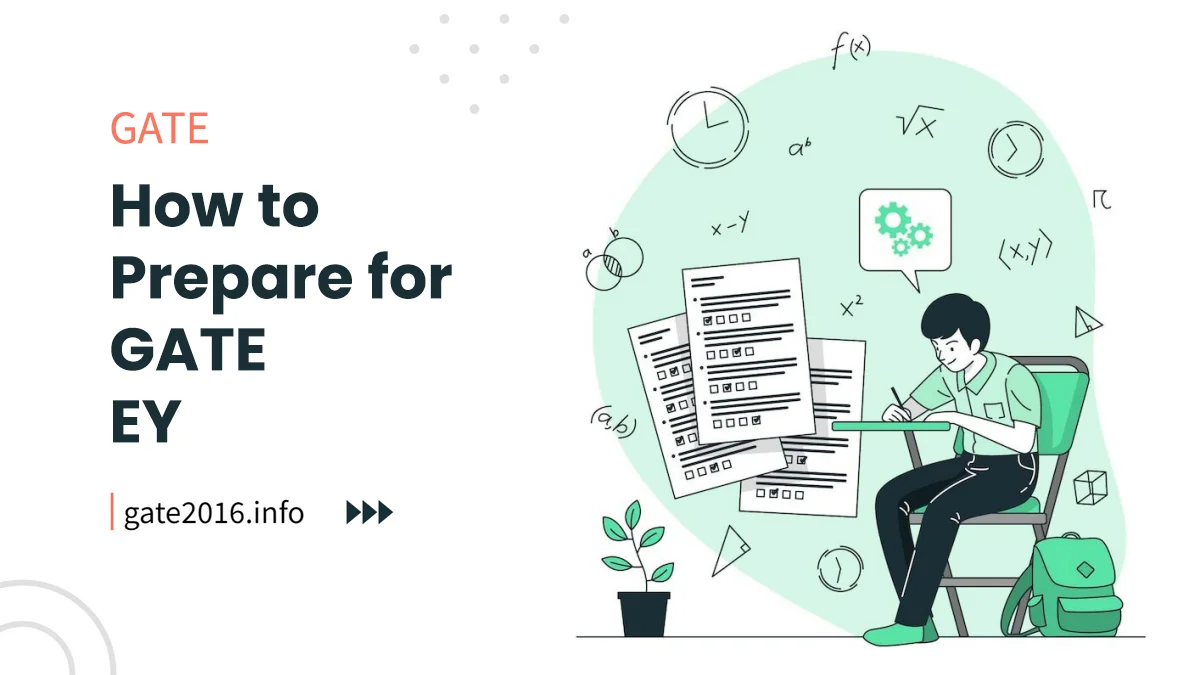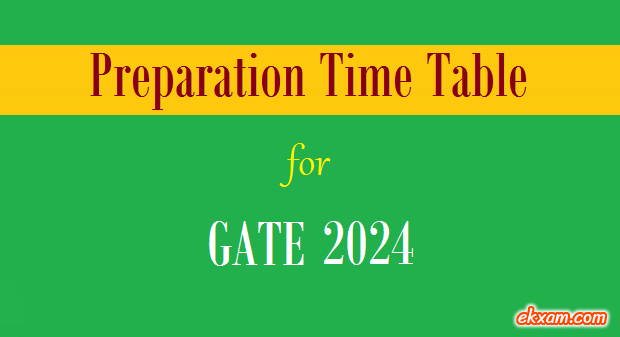Advertisements
Ratings

How to Prepare for GATE General Aptitude 2025 – General Aptitude is a vital section in the GATE (Graduate Aptitude Test in Engineering) exam.
Despite its lower weightage compared to technical subjects, a good score in General Aptitude can boost your overall GATE score significantly.
In this article, we’ll guide you through effective strategies and tips to prepare for the GATE General Aptitude section in 2025.
Understanding GATE General Aptitude
Before diving into preparation, it’s essential to understand the General Aptitude section’s structure and syllabus.
The General Aptitude section consists of four subsections:
- Part 1: Verbal Aptitude
- Part 2: Quantitative Aptitude
- Part 3: Analytical Aptitude
- Part 4: Spatial Aptitude
Contents
- Part 1: Verbal Aptitude
- Part 2: Quantitative Aptitude
- Part 3: Analytical Aptitude
- Part 4: Spatial Aptitude
- Choosing the Right Study Resources
- Time Management and Mock Tests
- Revision and Self-Assessment
- Staying Motivated
- Common Mistakes to Avoid
- Conclusion
- GATE General Aptitude Guidance
- How to Prepare for GATE General Aptitude FAQs
- GATE Total Information & Guidance
Part 1: Verbal Aptitude
Verbal Aptitude is a crucial component of the GATE General Aptitude section.
This subsection assesses your English language skills, including vocabulary, reading comprehension, and sentence formation.
Effective preparation in Verbal Aptitude is not only about memorizing words but also understanding their usage in context.
Let’s delve into strategies for Verbal Aptitude with real-world examples to illustrate their importance.
1. Vocabulary Enhancement
Building a strong vocabulary is fundamental to excelling in Verbal Aptitude.
A rich vocabulary enables you to comprehend complex texts and articulate your thoughts more precisely.
Here’s how you can enhance your vocabulary with real-world examples:
Strategy: Reading English Newspapers, Novels, and Magazines
- Example: Reading “The New York Times” regularly exposes you to diverse vocabulary. For instance, an article might use the word “ubiquitous” to describe the prevalence of smartphones in modern society. Understanding such words enhances your comprehension.
Strategy: Maintaining a Vocabulary Journal
- Example: You come across the word “ephemeral” while reading a novel. You note it down in your vocabulary journal along with its meaning. Later, you encounter the same word in a news article discussing the fleeting nature of online trends.
Strategy: Using Vocabulary Apps and Flashcards
- Example: Apps like “Vocabulary.com” offer interactive exercises and flashcards. You learn words like “pervasive” and “ephemeral” through engaging quizzes, making retention easier.
2. Comprehension Skills
Verbal comprehension is vital for understanding complex texts and answering questions accurately.
The ability to grasp the main idea and nuances in a passage is essential. Let’s explore how this skill works with real-world examples:
Strategy: Practice Reading and Summarizing Articles
- Example: Imagine you’re reading an article about climate change. Effective comprehension involves summarizing the main points, such as understanding the causes, consequences, and possible solutions discussed in the text.
Strategy: Solve Reading Comprehension Passages
- Example: In a GATE practice test, you encounter a passage about artificial intelligence (AI). Understanding the context and details in the passage helps you answer questions about AI’s impact on various industries accurately.
Strategy: Understand Context
- Example: In a sentence like “The scientist’s breakthrough was hailed as a game-changer,” understanding that “game-changer” refers to something revolutionary requires grasping the word’s contextual meaning.
3. Sentence Completion
Sentence completion tests your ability to form coherent sentences with appropriate words.
A strong grasp of sentence structures and word usage is crucial. Here are examples demonstrating the importance of this skill:
Strategy: Practice Sentence Completion Exercises
- Example: You’re given a sentence with a blank: “The ____ of the new smartphone amazed everyone.” Knowing that “features” or “specs” would be fitting in this context allows you to complete the sentence correctly.
Strategy: Learn Sentence Types
- Example: Recognizing sentence types, such as declarative, interrogative, imperative, and exclamatory, helps you understand the purpose and tone of sentences. For instance, an interrogative sentence asks a question, while an exclamatory sentence expresses strong emotion.
Real-world application: In a professional setting, constructing coherent sentences is crucial for effective communication.
When writing a business proposal, using appropriate words and sentence structures enhances your message’s clarity and persuasiveness.
In conclusion, Verbal Aptitude extends beyond the GATE exam—it’s a valuable skill in both academic and real-world contexts.
Effective preparation not only boosts your GATE score but also equips you with communication skills essential for success in various professional fields.
Part 2: Quantitative Aptitude
Quantitative Aptitude assesses your mathematical and numerical reasoning abilities.
It’s not just about solving equations but also understanding how to apply mathematical concepts to real-world scenarios.
In this section, we’ll explore strategies for Quantitative Aptitude along with real-world examples to demonstrate their practical relevance.
1. Strengthen Mathematical Fundamentals
A solid foundation in fundamental mathematical concepts is essential for excelling in Quantitative Aptitude.
Here’s how this applies to real-world situations:
Strategy: Revise Basic Concepts and Formulae
- Example: In engineering, understanding the formula for calculating the area of a circle (πr²) is crucial when designing structures or solving problems related to circular components, like gears or pipelines.
Strategy: Solve Mathematical Problems Daily
- Example: In finance, solving equations to calculate interest rates, loan repayments, or investment returns is essential for making informed financial decisions.
Strategy: Utilize Standard Math Textbooks and Online Resources
- Example: When working in data analysis, a solid understanding of statistical concepts, such as mean, median, and standard deviation, is necessary for interpreting data and making data-driven decisions.
2. Numerical Reasoning
Numerical reasoning involves the ability to think logically and analytically when dealing with numbers and data. This skill is highly applicable in various real-world scenarios:
Strategy: Practice Solving Numerical Reasoning Problems
- Example: In the field of market research, analysts use numerical reasoning skills to interpret consumer survey data and draw conclusions about market trends and preferences.
Strategy: Recognize Patterns in Data
- Example: Data scientists employ numerical reasoning to identify patterns in large datasets, allowing them to make predictions and recommendations in areas like healthcare, finance, and e-commerce.
Strategy: Utilize Online Platforms for Practice
- Example: Engineers use numerical reasoning skills to solve complex equations in structural analysis or fluid dynamics, ensuring the safety and efficiency of structures and systems.
3. Data Interpretation
Data Interpretation involves understanding and drawing insights from data presented in various formats, such as tables, graphs, and charts.
Proficiency in this skill is vital in real-world applications:
Strategy: Practice Interpreting Data
- Example: Business analysts use data interpretation skills to analyze sales data and create visual reports that guide strategic decisions, like product pricing and marketing campaigns.
Strategy: Improve Speed and Accuracy in Calculations
- Example: In the healthcare sector, medical researchers rely on data interpretation to analyze clinical trial results and assess the efficacy of new treatments.
Strategy: Review Basic Statistics Concepts
- Example: Economists use data interpretation to analyze economic data, such as GDP growth rates, unemployment rates, and inflation, to make economic forecasts and policy recommendations.
By mastering Quantitative Aptitude, you not only excel in the GATE exam but also gain valuable skills that have real-world applications in fields like engineering, finance, data science, market research, and many others.
These skills empower you to analyze, solve problems, and make informed decisions in various professional settings.
Part 3: Analytical Aptitude
Analytical Aptitude assesses your problem-solving and logical reasoning abilities.
This skill is not limited to solving puzzles but extends to critical thinking and making informed decisions.
In this section, we’ll explore strategies for Analytical Aptitude with real-world examples to demonstrate their practical relevance.
1. Develop Analytical Thinking
Analytical thinking is the ability to break down complex problems into manageable parts and systematically analyze them.
It’s a skill highly applicable in various real-world scenarios:
Strategy: Solve Analytical Reasoning Problems
- Example: In the field of cybersecurity, analysts use analytical thinking to dissect malware and identify vulnerabilities in computer systems, protecting organizations from cyber threats.
Strategy: Break Down Complex Problems
- Example: Engineers apply analytical thinking to troubleshoot technical issues in manufacturing processes, identifying root causes and implementing solutions to improve efficiency and quality.
Strategy: Practice Solving Puzzles and Brain Teasers
- Example: Management consultants use analytical thinking to tackle complex business challenges, such as optimizing supply chain operations, reducing costs, or expanding market reach.
2. Logical Reasoning
Logical reasoning involves the ability to think logically, make deductions, and draw conclusions based on given information.
This skill is invaluable in real-world applications:
Strategy: Practice Solving Logical Reasoning Puzzles
- Example: In law enforcement, detectives use logical reasoning to analyze evidence, build hypotheses, and solve crimes by identifying suspects and motives.
Strategy: Learn Different Types of Logical Reasoning
- Example: Computer programmers apply logical reasoning to design algorithms, ensuring that software functions correctly and efficiently.
Strategy: Improve Speed and Accuracy in Logical Reasoning
- Example: Project managers use logical reasoning to plan and execute projects, identifying potential risks and developing contingency plans to ensure successful project outcomes.
3. Critical Thinking
Critical thinking involves evaluating information, arguments, and evidence objectively to make sound decisions.
It’s a skill applicable in numerous real-world scenarios:
Strategy: Analyze and Evaluate Information Critically
- Example: In the field of medicine, doctors use critical thinking to diagnose patients’ conditions, interpret medical test results, and determine appropriate treatment plans.
Strategy: Identify Assumptions and Draw Conclusions
- Example: Environmental scientists employ critical thinking to analyze data on climate change, identifying causal relationships and proposing solutions to mitigate environmental issues.
Strategy: Review Case Studies and Real-Life Scenarios
- Example: Marketing professionals use critical thinking to assess consumer behavior data, identify trends, and develop marketing strategies that resonate with target audiences.
By developing Analytical Aptitude, you not only perform well in the GATE exam but also acquire valuable skills that have real-world applications across various fields.
These skills enable you to approach complex problems with confidence, make informed decisions, and contribute effectively to your chosen profession.
Part 4: Spatial Aptitude
Spatial Aptitude evaluates your ability to visualize and mentally manipulate objects in three-dimensional space.
This skill is essential in fields like architecture, engineering, and design.
In this section, we’ll explore strategies for Spatial Aptitude with real-world examples to demonstrate their practical relevance.
1. Visualization Skills
Visualization skills involve mentally picturing objects, shapes, and structures in three dimensions.
These skills are crucial for professionals who work with spatial concepts:
Strategy: Practice 3D Visualization Exercises
- Example: Architects use visualization skills to conceptualize building designs and layouts. They mentally visualize how spaces will look, considering factors like lighting, materials, and aesthetics.
Strategy: Study Maps and Blueprints
- Example: Civil engineers rely on visualization skills to interpret architectural blueprints and topographic maps when planning infrastructure projects like roads, bridges, and dams.
Strategy: Build Models and Prototypes
- Example: Product designers create physical prototypes or 3D computer models to visualize and refine product designs, ensuring they meet user needs and functionality requirements.
2. Spatial Orientation
Spatial orientation involves understanding the position, direction, and orientation of objects in space. This skill is applicable in fields such as navigation and geospatial analysis:
Strategy: Work with Maps and GPS
- Example: Pilots and navigators use spatial orientation skills to interpret aviation charts and GPS systems to determine aircraft position, altitude, and course.
Strategy: Use Geospatial Software
- Example: Urban planners employ spatial orientation to analyze geographic data and create city plans that optimize land use and infrastructure development.
Strategy: Practice with Compass and Maps
- Example: Outdoor enthusiasts like hikers and mountaineers use spatial orientation skills to read topographic maps, identify landmarks, and navigate safely in challenging terrain.
3. Mental Rotation
Mental rotation involves mentally rotating objects to determine how they would look from different angles.
This skill is valuable in fields like engineering and mechanics:
Strategy: Solve Mental Rotation Puzzles
- Example: Mechanical engineers use mental rotation skills to visualize how machine parts fit together, aiding in the design and troubleshooting of complex machinery.
Strategy: Understand Mechanical Systems
- Example: Automotive technicians apply mental rotation to diagnose and repair vehicles, mentally visualizing engine components and systems to identify issues.
Strategy: Practice with Architectural Models
- Example: Interior designers use mental rotation to arrange furniture and decor in a way that optimizes space and creates aesthetically pleasing room layouts.
4. Pattern Recognition
Pattern recognition involves identifying regularities or patterns in objects, shapes, or data.
This skill is essential in various real-world applications:
Strategy: Analyze Data Patterns
- Example: Data analysts use pattern recognition to identify trends in large datasets, helping businesses make informed decisions on market strategies and customer behavior.
Strategy: Recognize Structural Patterns
- Example: Structural engineers use pattern recognition to identify potential weaknesses or defects in buildings and bridges, ensuring structural integrity and safety.
Strategy: Study Art and Design
- Example: Graphic designers employ pattern recognition to create visually appealing designs, recognizing how patterns can enhance aesthetics and convey messages effectively.
By developing Spatial Aptitude, you not only perform well in the GATE exam but also gain valuable skills that have real-world applications in diverse fields.
These skills enable you to excel in professions that require spatial reasoning, creativity, and problem-solving, making you a versatile and sought-after professional.
Choosing the Right Study Resources
Selecting the right study materials is crucial for effective learning. Here are some recommended resources:
Table 1: Recommended Study Resources
| Resource Name | Description |
|---|---|
| “Verbal and Non-Verbal Reasoning” by R.S. Aggarwal | Comprehensive book covering reasoning skills and verbal ability. |
| “Quantitative Aptitude for Competitive Examinations” by R.S. Aggarwal | A widely used book for quantitative aptitude and mathematics preparation. |
| “Word Power Made Easy” by Norman Lewis | Enhance vocabulary and language skills with this popular book. |
| “GATE General Aptitude” by ACE Engineering Publications | Specialized study material focusing on the GATE General Aptitude section. |
| Previous Years’ GATE Papers | Practicing questions from past years’ papers is invaluable for exam preparation. |
| Online Mock Tests | Various websites offer free and paid mock tests to simulate exam conditions. |
| GATE General Aptitude Apps | Mobile apps provide quick quizzes and practice tests for on-the-go learning. |
Time Management and Mock Tests
Efficient time management is crucial during the GATE exam. You should aim to solve General Aptitude questions within the allocated time.
Regularly taking mock tests helps you improve your time management skills and assess your preparation level.
| Action | Description |
|---|---|
| Set Time Limits | When practicing, set strict time limits for each General Aptitude subsection to simulate exam conditions. |
| Identify Weak Areas | Analyze your performance in mock tests to identify your weak areas and focus your revision accordingly. |
| Take Full-Length Mock Tests | Periodically take full-length GATE mock tests to assess your overall performance and stamina. |
| Practice Previous Year Papers | Solve previous year’s General Aptitude question papers to get acquainted with the exam pattern and question types. |
Revision and Self-Assessment
Revision is a critical phase of your preparation. It helps consolidate your learning and improve retention.
Here’s how you can effectively revise and self-assess your readiness:
| Action | Description |
|---|---|
| Create Summary Notes | Summarize key concepts, formulas, and vocabulary in concise notes for quick revision. |
| Use Flashcards | Create flashcards for vocabulary and mathematical formulas to review them anytime, anywhere. |
| Self-Assessment | Regularly assess your progress by taking self-assessment quizzes and reviewing your mock test performance. |
Staying Motivated
GATE preparation can be challenging and long. Staying motivated is crucial for consistent progress.
Here are some strategies to help you stay motivated:
| Action | Description |
|---|---|
| Set Achievable Goals | Break your preparation into smaller, achievable goals, and celebrate your achievements along the way. |
| Join Study Groups | Join or form study groups to stay motivated through discussions, doubt-solving, and peer support. |
| Visualize Success | Visualize your success in the GATE exam and remind yourself of the career opportunities it can open for you. |
Common Mistakes to Avoid
To maximize your GATE General Aptitude score, it’s crucial to avoid common mistakes that aspirants often make:
| Action | Description |
|---|---|
| Neglecting Practice | Focusing solely on technical subjects and neglecting General Aptitude practice can lead to a lower score. |
| Ignoring Mock Tests | Not taking mock tests regularly can result in poor time management during the actual exam. |
| Overlooking Revision | Skipping revision may lead to forgetting important concepts and formulas. Regularly revise to retain knowledge. |
Conclusion
Preparing for the GATE General Aptitude section requires dedication and a well-structured approach.
By following the strategies and tips outlined in this article, you can enhance your Verbal and Numerical Abilities, improve time management, and stay motivated throughout your preparation journey.
Remember, a strong General Aptitude score can significantly boost your overall GATE score, opening doors to exciting opportunities in your engineering career.
Happy studying, and best of luck with your GATE 2025 preparations!
GATE General Aptitude Guidance
- How to Prepare for GATE General Aptitude 2025: Tips and Strategies
- GATE GA Syllabus 2025: General Aptitude
How to Prepare for GATE General Aptitude FAQs
What is the importance of the General Aptitude section in GATE?
The General Aptitude section in GATE is vital as it contributes to your overall score. It evaluates your language comprehension and analytical abilities, which are essential in engineering and technology fields.
How should I start preparing for the GATE General Aptitude section?
Begin by familiarizing yourself with the question types. Practice regularly to improve your comprehension, vocabulary, and mathematical skills. Solve previous years' papers to get a feel for the exam pattern.
Are there specific books or resources for GATE General Aptitude preparation?
Yes, there are books and study materials available that focus on GATE General Aptitude. Some popular choices include R.S. Aggarwal's 'Quantitative Aptitude' and books on verbal and non-verbal reasoning.
Should I allocate a specific study time for General Aptitude, or can I focus more on technical subjects?
Balancing your time is crucial. Allocate a portion of your study schedule to General Aptitude, as it can boost your overall score and help you secure admission to top institutes.
Is practicing previous years' GATE questions for General Aptitude sufficient?
While practicing previous years' questions is beneficial, also consider taking mock tests and solving sample papers to gauge your progress and time management skills. This comprehensive approach ensures better preparation.
Recent Posts
- AAI Through GATE 2024 – JE (Junior Executive)
- M Tech and MS Programs Through GATE and GRE: Navigating Postgraduate Options
- Job Opportunities After GATE 2024 in India: What You Didn’t Know!
- BSPHCL Through GATE 2024 – 40 AEE
Related Tags
How to prepare for gate general aptitude quora, How to prepare for gate general aptitude pdf, general aptitude for gate pdf, what is general aptitude in gate, gate aptitude syllabus, weightage of general aptitude in gate, gate general aptitude verbal aptitude, gate aptitude important topics
| GATE (Reasoning & Aptitude & Maths) Books |
| GATE Guide Books |
GATE Total Information & Guidance
Click below given links to get further information.







